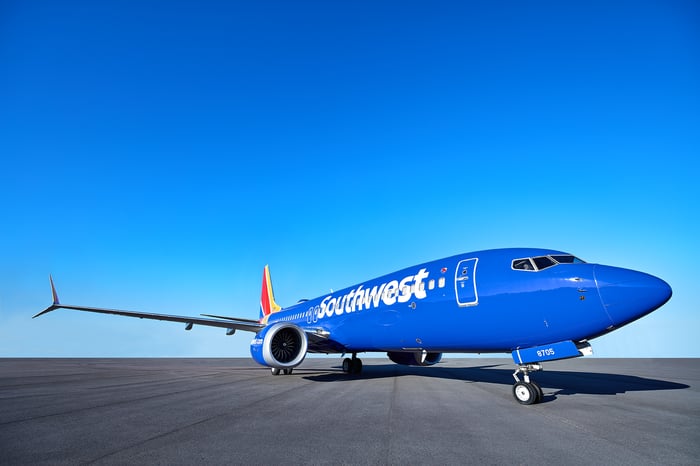Since the high-profile grounding of Boeing's (BA -0.49%) 737 MAX following two fatal crashes linked to poorly designed software, there's been a lot of speculation about whether Southwest Airlines (LUV -1.00%) is reassessing its commitment to the 737 MAX. Southwest, which has more than 750 planes in its all-Boeing 737 fleet, is naturally the biggest customer for the latest version of Boeing's workhorse jet. It has 265 outstanding firm orders for 737 MAX jets (including leases), plus another 115 options.
Recent comments by Southwest Airlines CEO Gary Kelly seemed to suggest that the airline was looking at other options. Reports that Southwest executives have been checking out Airbus' (EADSY -1.27%) A220 added fuel to the rumors.
However, Southwest's flirtation with the Airbus A220 -- or any other model for that matter -- is probably not very serious. Let's see why.
Southwest Airlines' CEO raises eyebrows
In a speech at the North Dallas Chamber of Commerce on April 18, Kelly noted that Southwest Airlines is always looking at new aircraft types. In addition to wanting to understand the aircraft its competitors use, Southwest's management feels obligated to evaluate all of the options -- even though it has never deviated from the Boeing 737 thus far.

Southwest Airlines has historically been an all-Boeing 737 carrier. Image source: Southwest Airlines.
A week later, in an interview with TV personality Jim Cramer, Kelly said that the company was "not happy" about the problems with the 737 MAX. He also indicated that while the airline is an all-Boeing 737 carrier today, that might not be true in "perpetuity."
Around the same time, The Air Current (subscription required) reported that Southwest had met with a European airline that uses the Airbus A220 to learn more about that new aircraft type. This appeared to confirm the idea that Southwest is starting to think seriously about diversifying away from the 737 -- if not abandoning it entirely.
Don't expect big changes soon
Despite the headlines, it's very unlikely that Southwest Airlines is going to add a new aircraft type anytime in the near future. In the same interview with Jim Cramer, Kelly said that Southwest still believes the 737 MAX is "the best single-aisle airplane in the world." Moreover, The Air Current reported that while the carrier is evaluating the A220, it's also thinking about expanding its Boeing 737 MAX order even further if near-term delivery slots become available.

Southwest is considering ordering even more Boeing 737 MAX jets. Image source: Southwest Airlines.
Indeed, operating a single fleet type is one of the main ways that Southwest Airlines keeps costs low. Being an all-Boeing 737 airline boosts productivity, simplifies maintenance, reduces pilot training costs, and minimizes the complexity of scheduling.
Even if a different aircraft type might be more efficient for certain routes than a Boeing 737, it would be hard to overcome the added costs of operating a mixed fleet. Replacing all of the 737s with a different aircraft type would be even more impractical. It would cost tens of billions of dollars and would probably take at least a decade, given the size of Airbus' backlog.
That's probably why Kelly stated just two months ago that Southwest would be an all-Boeing 737 carrier as long as he is CEO. (He's in no rush to retire, either.)
Of course the Boeing 737 isn't Southwest's "forever" plane
While Southwest Airlines is unlikely to deviate from its single-fleet-type strategy in the near future, in one sense it's obvious that the carrier won't be an all-Boeing 737 airline forever.
Prior to developing the 737 MAX, Boeing had planned to build an all-new single-aisle plane to replace the 737. The massive success of the Airbus A320neo family forced Boeing to come up with a competing concept that could be brought to market sooner (i.e. the 737 MAX).
Nevertheless, Boeing still plans to replace the 737 with a clean-sheet design, most likely around 2030. As a result, in a little more than a decade, Southwest will be forced to start upgrading its fleet to something other than a new version of the Boeing 737. At that point, Southwest might consider more seriously whether it should replace the 737 with one new aircraft type or two.
First, all of Southwest's pilots would need to be trained to fly whatever replaces the 737, so the incremental cost of training some of them to fly a different aircraft type instead would be quite manageable. Second, the fleet transition will take more than a decade to execute, so the carrier would already be dealing with the inefficiencies of operating multiple fleet types for a long transition period.
Thus, it's true that Southwest Airlines won't fly only Boeing 737s forever -- and it's also true that the carrier could eventually operate multiple aircraft types. But for the next decade at least, the Boeing 737 will continue to reign supreme at Southwest.





